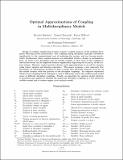Optimal Approximations of Coupling in Multidisciplinary Models
Author(s)
Peherstorfer, Benjamin; Baptista, Ricardo Miguel; Marzouk, Youssef M; Willcox, Karen E
Downloadoptimal-decoupling-MDO-UQ.pdf (5.594Mb)
OPEN_ACCESS_POLICY
Open Access Policy
Creative Commons Attribution-Noncommercial-Share Alike
Terms of use
Metadata
Show full item recordAbstract
Design of complex engineering systems requires coupled analyses of the multiple disciplines affecting system performance. The coupling among disciplines typically contributes significantly to the computational cost of analyzing the system, and can become particularly burdensome when coupled analyses are embedded within a design or optimization loop. In many cases, disciplines may be weakly coupled, so that some of the coupling or interaction terms can be neglected without significantly impacting the accuracy of the system output. However, typical practice derives such approximations in an ad hoc manner using expert opinion and domain experience. This paper proposes a new approach that formulates an optimization problem to find a model that optimally balances accuracy of the model outputs with the sparsity of the discipline couplings. An adaptive sequential Monte Carlo sampling-based technique is used to efficiently search the combinatorial model space of different discipline couplings. Finally, an algorithm for optimal model selection is presented and applied to identify the important discipline couplings in a fire detection satellite model and a turbine engine cycle analysis model.
Date issued
2017-01Department
Massachusetts Institute of Technology. Department of Aeronautics and AstronauticsJournal
58th AIAA/ASCE/AHS/ASC Structures, Structural Dynamics, and Materials Conference
Publisher
American Institute of Aeronautics and Astronautics (AIAA)
Citation
Baptista, Ricardo, et al. “Optimal Approximations of Coupling in Multidisciplinary Models.” 58th AIAA/ASCE/AHS/ASC Structures, Structural Dynamics, and Materials Conference, 9-13 January 5, 2017, Grapevine, Texas, American Institute of Aeronautics and Astronautics (AIAA), 2017.
Version: Author's final manuscript
ISBN
978-1-62410-453-4